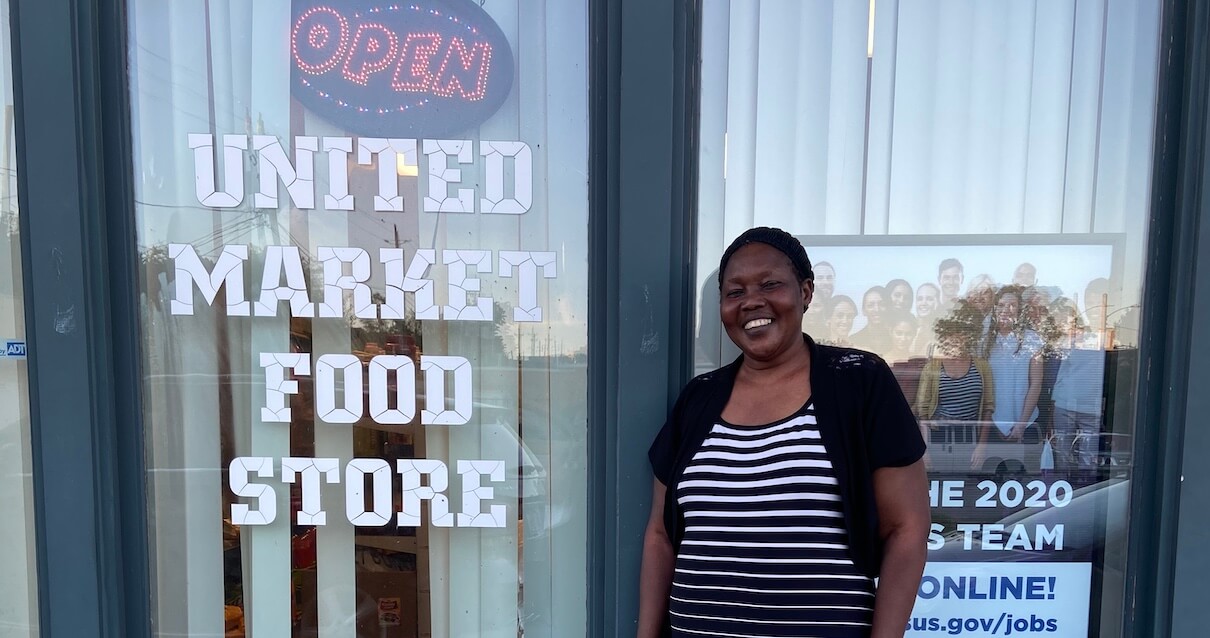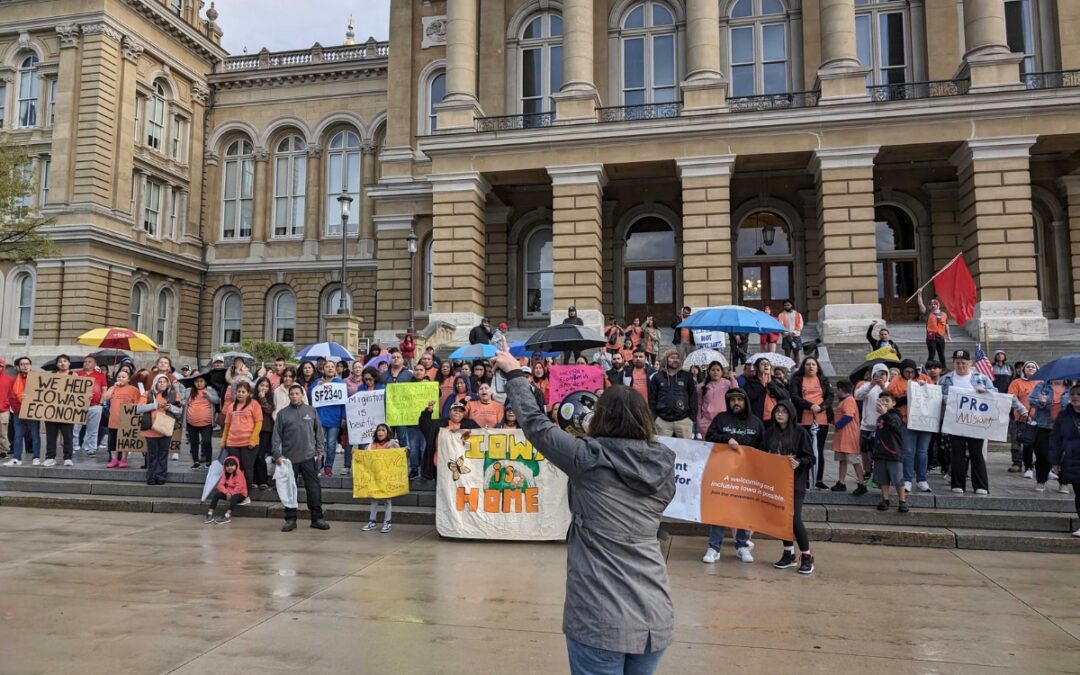
Gov. Kim Reynolds signed an executive order June 18 establishing the Governor’s Economic Recovery Advisory Board. The announcement reads: “The Governor’s Economic Recovery Advisory Board assembles an impressive group of business leaders to propel our recovery efforts forward and position Iowa for growth. Iowans will be at the center of this effort as we continue to make our state the best place to live, work and raise a family.”
The makeup of the advisory board is packed with Iowa corporate leaders, including finance executives from Ruan Transportation, Hy-Vee and Principal Financial.
Small business owners are not part of this elite group, let alone small businesses owned by people of color. Minority business owners are great contributors to the Iowa economy and generate thousands of jobs.
Realizing the lack of inclusion in the advisory board, I knew someone who could shed some light on the coronavirus-related challenges faced by small and minority-owned businesses.
Deidre DeJear, a small businesses owner in Des Moines, ran for secretary of state in 2018 and has been a strong voice advocating for and empowering small businesses to grow.
[inline-ad id=”3″]
One of her efforts to encourage that growth and development was to establish a personal financial education program through the Financial Empowerment Center.
I asked her about how these small businesses have been impacted by the pandemic and if they have been supported by the state and federal government.
“Early on there were some federal and state programs that were intended to help small businesses,” DeJear said. “However, some of the unintended consequences that occurred is that businesses of color disproportionately did not have access to funding to help businesses through this pandemic.”
DeJear explained that some of those indicators were the qualifications of these programs that require having a certain number of employees.
“In communities of color, sometimes it’s just one or two employees, or if you can’t afford the benefits of having more, so you contract part-time employees to help fulfill the needs that you have, or some seasonal jobs. What these programs did was really carve businesses out of the process,” she said.
[inline-ad id=”2″]
In addition to these challenges, people of color who own small businesses also are less likely to have a strong relationship with their financial institution.
Small business owners have been doing their best to cope with COVID-19. But the pandemic exacerbated the systemic challenges business owners of color already faced.
Another problem is the lack of access to information for many immigrants and refugees that own small businesses.
Many of these owners did not even realize the severity of the pandemic because they have no access to information in their own language.
A small Latino business facing challenges due to COVID-19 is Grand Furniture and Mattress on the east side of Des Moines. Juan and Martha have owned this business for 13 years.
[inline-ad id=”1″]
This hardworking couple has faced hard times before when their business caught fire in November 2016. Juan said it took them three years to reopen because it was extremely difficult to deal with their insurance company.
They finally were starting to recover from the fire when the coronavirus hit Iowa.
“It was devastating for us since March, April and May are the best months for us because that is when people usually get their tax returns and they have the money to buy furniture,” Juan said.
They prepared for the strongest months by having more furniture in their inventory, but they had to close the business and they still had to pay all their bills for the business.
“After we were allowed to open, our customers were willing to buy, but one of our biggest problems is that manufacturers are now operating at about 25 to 30% of their capacity because they don’t have enough people working. The warehouses don’t have employees to pack and deliver the product.”
[inline-ad id=”4″]
Juan and his wife found out about the federal Paycheck Protection Program and applied for it, but did not qualify because one of the requirements is to have employees on their payroll.
“It’s only me and my wife in the business, and sometimes we don’t even get a paycheck,” he said.
After further research with the Small Business Administration, they applied for a small loan that came after about a month-and-a-half. Juan believes they were lucky to get that loan because he knows of at least four small business owners that had to close due to the pandemic.
Another Latino business, owned by Blanca Plascencia, had a different experience. Blanca owns two Mexican restaurants and is in the process of opening a third. She applied and received a five-year loan to open El Fogón in 2017.
With hard work and dedication, she was able to pay it back in full in a year-and-a-half. Last year she applied and received another loan to open a second restaurant.
[inline-ad id=”5″]
Blanca has established a good relationship with her bank and was able to receive a PPP loan because at the time she had 20 employees on her payroll. Thanks to that assistance, she was able to pay her employees when the restaurant was only open for carry-out.
Although Blanca had a positive experience with the PPP assistance, I asked about her thoughts on the relationship between state agencies and the immigrant entrepreneur community in Iowa.
“We need these agencies to hire immigrants that understand our culture and our struggles,” she said. “Hire staff that understand our culture and speak our language and help us navigate the system and give us the confidence we need to apply for these programs.”
Lack of communication, policies, staff, and communication that is relevant to communities of color has been an issue for years and it prevents progress for those who make Iowa not only vibrant but economically strong.
Des Moines is home to Erika, a refugee from Sudan who owns The United Market, an African grocery and clothing store serving a growing community of new Iowans.
[signup_form]
She learned about the pandemic because many of her clients were buying large quantities of rice, sugar, and other products, leaving her short on inventory.
“I asked what was going on to my clients and I was told about the pandemic,” she said.
When she called Chicago and Minneapolis distributors to get more supplies, they told her they could not send anything because they did not have anybody to transport their products.
“I heard rumors about the government helping small businesses, but I didn’t know where and how to apply for the relief offered by the government,” Erika said.
She added that although her husband, daughter and herself are citizens, they did not receive the stimulus checks, either.
To continue to help her customers, one of her biggest problems was getting the products she used to sell. Somehow, she had to have the money to pay rent and all her bills without any type of the same government assistance others received more easily.
[inline-ad id=”6″]
These are a few examples of the disconnect between the government and small businesses, specifically with communities of color.
It feels like these communities are invisible to the governor. The most vulnerable might not have the means to contribute to political campaigns but they have the power of the vote, and I have a feeling they will remember their experience with state and federal government by Election Day.
The pandemic has shown us that big companies and executives are the ones who have the governor’s ear and VIP seats in this administration.
A strong economy is not only sustained by wealthy corporations, but also by the small businesses that cater to those doing the essential work required to move our state and our country.
There is a great push to become an attractive city and state for innovative workers. To become that kind of place also depends on having a vibrant and diverse community. Instead, the governor has decided to exclude their representation.
One thing is for sure, many of these businesses will thrive — they always have and they always will.
By Claudia Thrane
Posted 7/30/20
Iowa Starting Line is an independently-owned progressive news outlet devoted to providing unique, insightful coverage on Iowa news and politics. We need reader support to continue operating — please donate here. Follow us on Twitter and Facebook for more coverage.

VIDEO: Hampton businesses targeted with anti-immigrant flyers
Earlier this month, the Latino community in Hampton, Iowa was rocked by what locals are calling a hate crime: employees of Latino-owned businesses...

Immigrant Iowans, major ag workforce, wonder if they should stay here
by Mónica Cordero, Investigate Midwest/Report for America Leer en español Having spent more than half her life in Waterloo, Iowa, she has built a...

Opinion: In the wake of Tyson, let’s rethink Iowa’s immigration stance
In Iowa, we often pride ourselves on our resilience and self-reliance. However, the truth is our state's prosperity heavily depends on, both...

The fight against ‘clearly unconstitutional’ Iowa immigration law
Recent Iowa immigrants and allies are still fighting against an Iowa immigration law they say unfairly discriminates against and targets them....

Advocates file suit to stop Iowa’s ‘unconstitutional’ immigration law
Immigration advocates filed a federal lawsuit Thursday to stop Iowa’s new immigration law—SF 2340—from taking effect arguing that the legislation...

Iowa Latinos rally to oppose new ‘unjust’ law targeting their community
Iowa's new anti-immigrant law is based on a Texas law that some argue is unconstitutional Jose Alvarado wasn’t shocked when Republicans in the Iowa...




